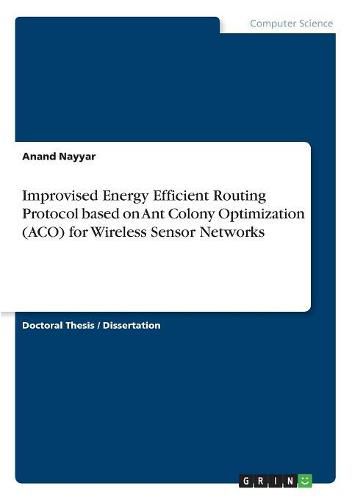Readings Newsletter
Become a Readings Member to make your shopping experience even easier.
Sign in or sign up for free!
You’re not far away from qualifying for FREE standard shipping within Australia
You’ve qualified for FREE standard shipping within Australia
The cart is loading…






Doctoral Thesis / Dissertation from the year 2017 in the subject Computer Science - Miscellaneous, course: Ph.D Computer Science, language: English, abstract: Routing and Energy Efficiency is regarded as highly challenging area of Sensor networks. Significant advancements in Wireless Sensor Networks (WSNs) opens doors for wide implementation in real-time applications like Industrial Monitoring, Smart Cities development, Underwater monitoring operations, tracking objects and many more. Energy Efficient routing is regarded as the most challenging task. Sensor networks mostly operate in complex and dynamic environments and routing becomes tedious task to maintain as the network size increases. Lots of routing protocols- Reactive, Proactive and Hybrid are proposed by researchers but every protocol faces some limitations in terms of energy, routing, packet delivery ratio and security. Therefore, to overcome all the routing issues, the trend has shifted to Biological based Algorithms like Swarm Intelligence based techniques. Ant Colony Optimization based routing protocols have demonstrated exceptional results in terms of performance when applied to WSN routing. This thesis outlines routing protocols in sensor networks, highlight the concept of Swarm Intelligence and presents various Ant Colony Optimization based routing protocols for sensor networks. In addition to this, we present Ant Colony based Energy Efficient routing protocol (IEEMARP = Improvised Energy Efficient Multipath Ant Based Routing Protocol) for sensor networks. The proposed protocol takes into consideration various performance metrics like Packet Delivery Ratio, Throughput, Energy Efficiency, Routing Overhead and End-to-End delay. Proposed protocol is simulated and tested using NS-2.35 simulator. Simulation based results stated that IEEMARP routing protocol is overall 16% more efficient in terms of Packet delivery ratio, Energy Efficiency, Throughput, Routing Overhead and End-to-End delay as compared
$9.00 standard shipping within Australia
FREE standard shipping within Australia for orders over $100.00
Express & International shipping calculated at checkout
Doctoral Thesis / Dissertation from the year 2017 in the subject Computer Science - Miscellaneous, course: Ph.D Computer Science, language: English, abstract: Routing and Energy Efficiency is regarded as highly challenging area of Sensor networks. Significant advancements in Wireless Sensor Networks (WSNs) opens doors for wide implementation in real-time applications like Industrial Monitoring, Smart Cities development, Underwater monitoring operations, tracking objects and many more. Energy Efficient routing is regarded as the most challenging task. Sensor networks mostly operate in complex and dynamic environments and routing becomes tedious task to maintain as the network size increases. Lots of routing protocols- Reactive, Proactive and Hybrid are proposed by researchers but every protocol faces some limitations in terms of energy, routing, packet delivery ratio and security. Therefore, to overcome all the routing issues, the trend has shifted to Biological based Algorithms like Swarm Intelligence based techniques. Ant Colony Optimization based routing protocols have demonstrated exceptional results in terms of performance when applied to WSN routing. This thesis outlines routing protocols in sensor networks, highlight the concept of Swarm Intelligence and presents various Ant Colony Optimization based routing protocols for sensor networks. In addition to this, we present Ant Colony based Energy Efficient routing protocol (IEEMARP = Improvised Energy Efficient Multipath Ant Based Routing Protocol) for sensor networks. The proposed protocol takes into consideration various performance metrics like Packet Delivery Ratio, Throughput, Energy Efficiency, Routing Overhead and End-to-End delay. Proposed protocol is simulated and tested using NS-2.35 simulator. Simulation based results stated that IEEMARP routing protocol is overall 16% more efficient in terms of Packet delivery ratio, Energy Efficiency, Throughput, Routing Overhead and End-to-End delay as compared